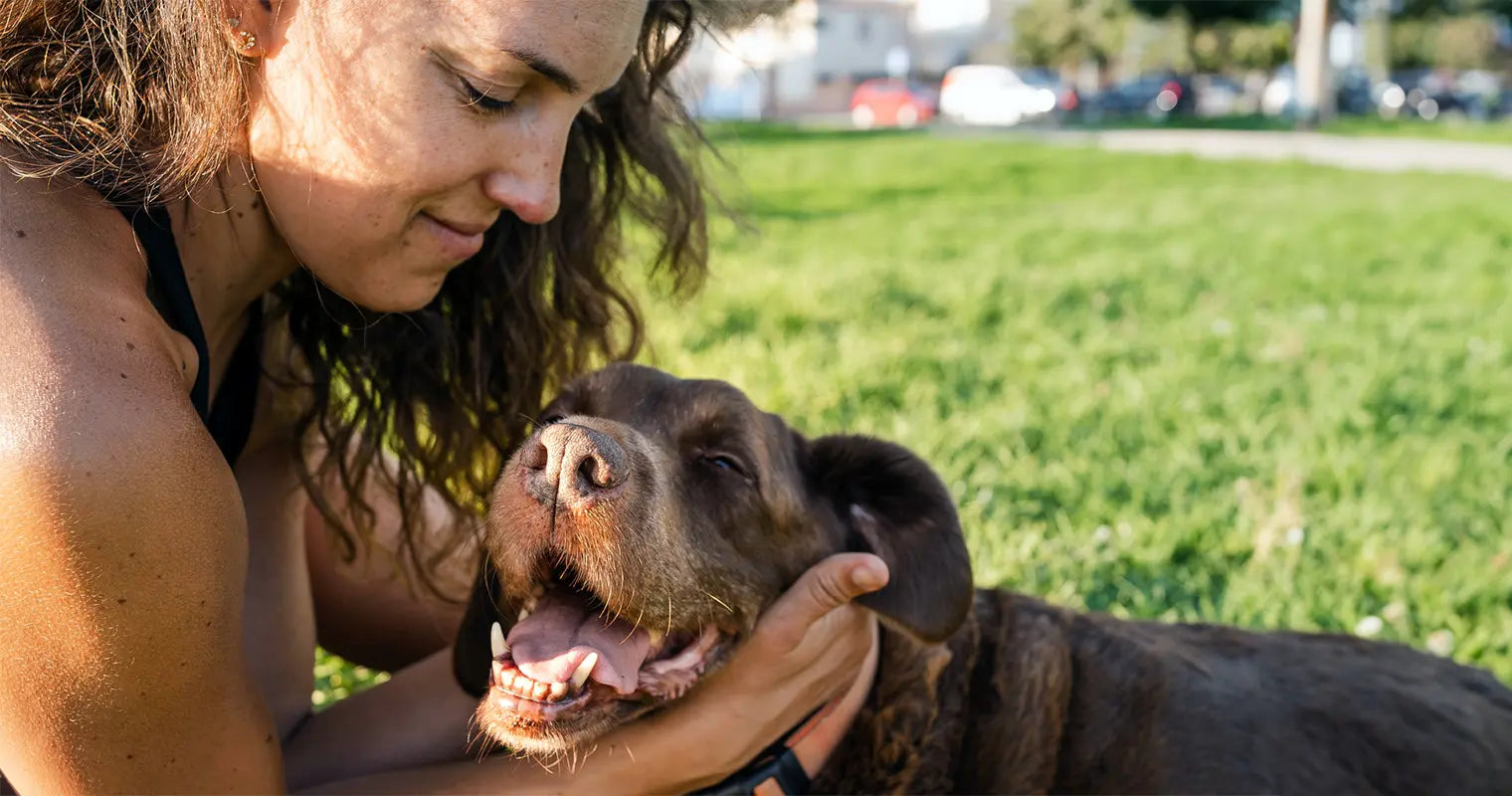7. Dogs make you happier
You know that warm, fuzzy feeling you get when you cuddle or pet a dog? That’s caused by oxytocin, a hormone often referred to as the “cuddle chemical.” Oxytocin increases feelings of relaxation, trust, and happiness. One study found that simply gazing into a dog’s eyes causes a big spike in oxytocin levels in both the dog and their human counterpart. Add on the stress-relieving benefits mentioned above, and you have a surefire recipe for increased happiness.

8. Dogs help you sleep better
If simply petting a dog can make you feel calmer and happier, imagine what sleeping next to your pup can do. While sharing your bed with your dog might not be for everyone (especially if they’re a giant breed), the release of oxytocin that comes from being close to your dog promotes theta brainwaves, which occur during meditation and REM sleep. This means you’re more likely to sleep deeper when your dog is nearby. Additionally, close contact with your dog can reduce the stress hormone cortisol, further enhancing your sleep quality.
9. Dogs can support senior citizens
Dogs can be popular companions for senior citizens, providing loving companionship and encouraging regular physical activity and social interactions. Additionally, studies have found that interactions with dogs can improve cognitive function in seniors with mental illness and reduce agitated behaviors in seniors with dementia.
10. Dogs can reduce symptoms of PTSD
Therapy dogs are amazing support animals for people with PTSD. In one study, military veterans with PTSD living with a service dog exhibited significantly reduced PTSD symptoms, anger, anxiety, sleep disturbance, and alcohol abuse than those on the therapy-dog waitlist. The findings suggest that, in combination with usual care, service dogs can greatly benefit veterans with PTSD psychologically and physiologically.
11. Dogs can detect certain medical conditions
Dogs have an extraordinary sense of smell which allows them to detect certain medical conditions. For example, some dogs are trained to alert their guardians to impending seizures, while others are trained to recognize drops in blood sugar. There’s even some evidence that dogs can smell cancer in humans before it’s diagnosed. For those with certain conditions, dogs’ keen senses can provide early warnings and potentially life-saving alerts.
12. Dogs are great company
A dog is the ultimate companion, always ready to join in on your daily adventures and cuddle sessions. They’re not just a pet — they’re a best friend who sticks by you through thick and thin. Their loyal and affectionate nature means you’ll always have a supportive friend by your side, ready to lift your spirits on tough days and share in your joy on good ones. Plus, who else will listen to your rants without any judgment?
Considering adopting a dog?
While dogs are undoubtedly awesome (it’s science, after all), it’s essential to consider if you’re ready for a dog before adopting one. Here are some important factors to mull over:
-
Time commitment
Dogs require a considerable amount of time and attention. They need daily exercise, feeding, grooming, training, and social interaction. Puppies, in particular, need more time for training and socialization. Think about your daily schedule to make sure you can dedicate the necessary time to care for a dog.
-
Lifestyle compatibility
Evaluate your lifestyle to determine if it is compatible with dog parenthood. Consider factors such as your work hours, travel frequency, activity level, living space, and other people in your household.
For example, if you’re less active or living in an apartment, a small dog (or even a cat) with less exercise and space demands would be a better choice than a large dog like a German Shepherd. You’ll also need to dog-proof your living space to make your home safe for your new pup.
-
Financial responsibility
Being a dog parent comes with several expenses, including dog food, various dog supplies, veterinary care, and pet insurance. Make sure you have the financial stability to cover these ongoing costs.
-
Long-term commitment
Depending on the breed, dogs can live for 10 to 15 years, or more. You need to be confident that you’re ready for a long-term commitment and are prepared to care for your dog throughout their entire life. Consider how your life might change over the years and whether you will still be able to provide for your dog.
-
Training and socialization
Training is essential for a well-behaved dog. Some dogs come with training, but certainly not all. For those who aren’t trained, be prepared to invest time in teaching your dog basic commands, good manners, and potty-training. Socialization is equally important to ensure your dog is comfortable around other animals, people, and different environments. Consider enrolling your pup in a dog-training class or working with a professional trainer if needed.
-
Impact on other pets
If you already have other pets, consider how a new dog will fit into the household. Some pets may have difficulties adjusting to a new dog. The introduction should be gradual and supervised to promote harmony among your pets.
If you’ve carefully considered all of the above, and are ready to adopt a dog, you can use to find your new family member today.






